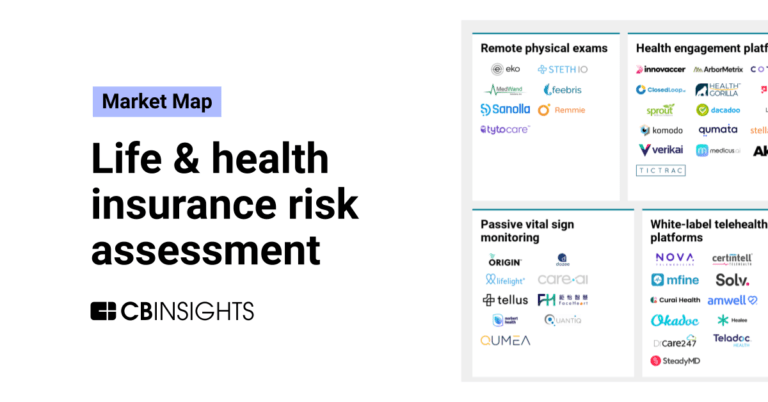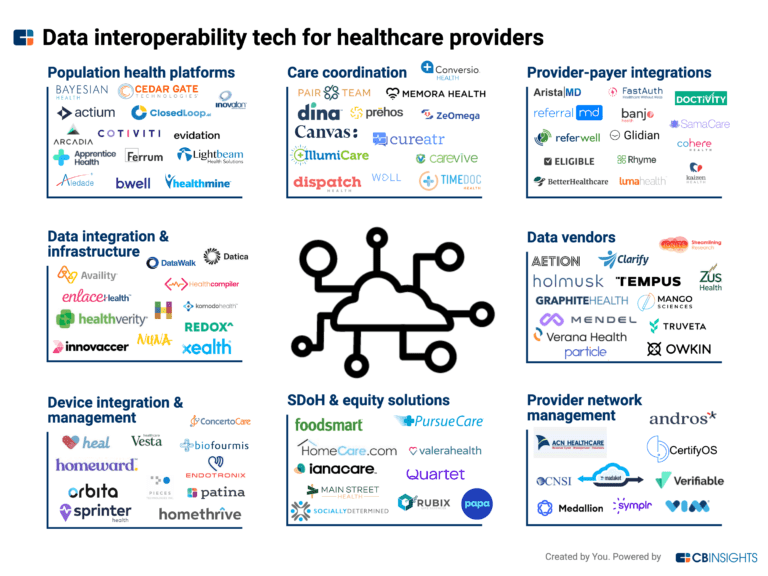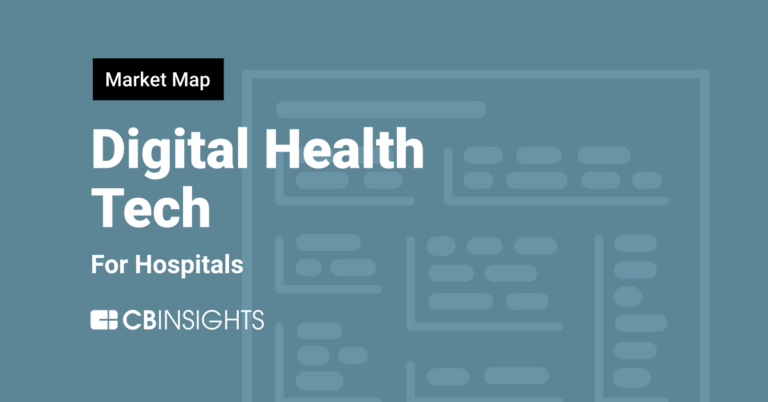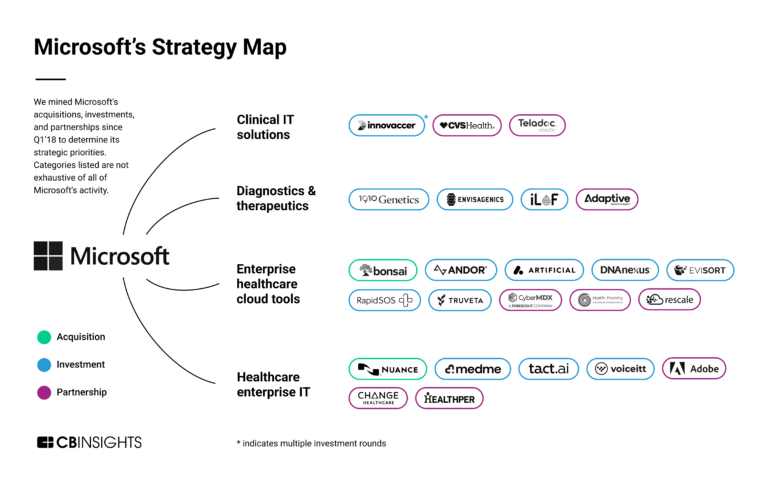
Innovaccer
Founded Year
2014Stage
Series F | AliveTotal Raised
$650.68MValuation
$0000Last Raised
$275M | 3 mos agoRevenue
$0000Mosaic Score The Mosaic Score is an algorithm that measures the overall financial health and market potential of private companies.
+141 points in the past 30 days
About Innovaccer
Innovaccer is a healthcare technology company that provides a platform for data activation and analytics in value-based care. The platform integrates and analyzes healthcare data for clinical, financial, operational, and experiential outcomes. Innovaccer's solutions serve providers, payers, the public sector, and life sciences. It was founded in 2014 and is based in San Francisco, California.
Loading...
Innovaccer's Product Videos
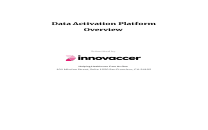
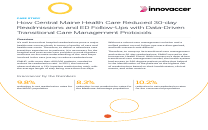
ESPs containing Innovaccer
The ESP matrix leverages data and analyst insight to identify and rank leading companies in a given technology landscape.
The population health data platforms market provides software solutions that help healthcare providers and organizations to manage and analyze data related to the health of a defined population, such as a specific community or patient group. These platforms enable the collection and integration of data from various sources, including electronic health records, claims data, social determinants of h…
Innovaccer named as Highflier among 13 other companies, including Health Catalyst, NeuroFlow, and Lumeris.
Innovaccer's Products & Differentiators
Data Activation Platform (DAP)
The Innovaccer Data Activation Platform (DAP) is the leading healthcare platform that offers integration capability with an in-built Extract-Transform-Load (ETL) process and algorithms/rules to ensure the acquired data is transformed and presented in a unified manner.
Loading...
Research containing Innovaccer
Get data-driven expert analysis from the CB Insights Intelligence Unit.
CB Insights Intelligence Analysts have mentioned Innovaccer in 8 CB Insights research briefs, most recently on Nov 10, 2023.
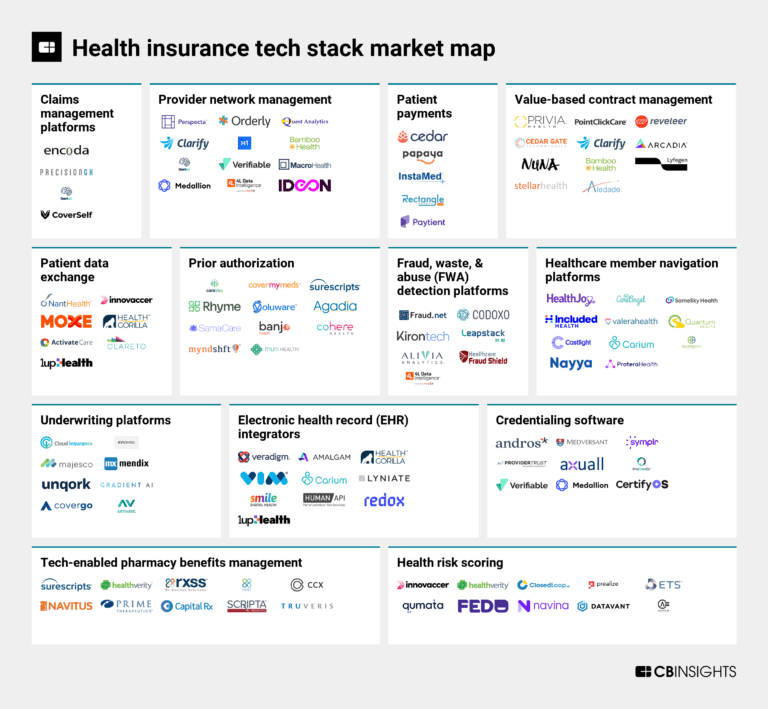
Nov 10, 2023
The health insurance tech stack market map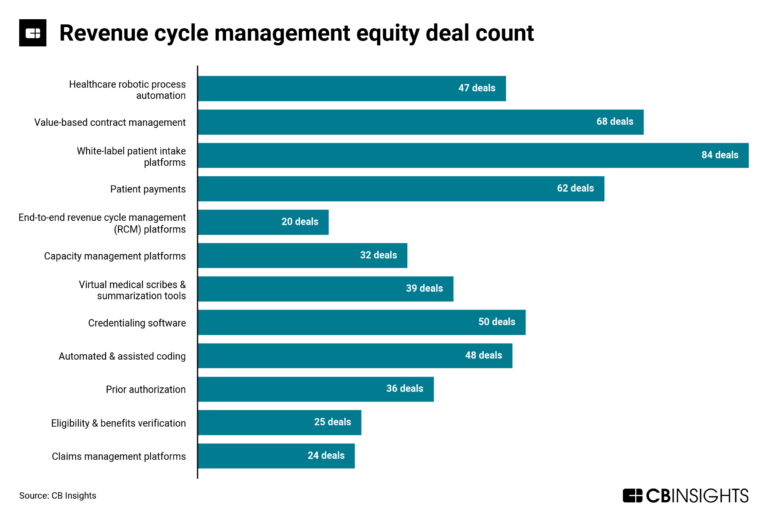
Sep 22, 2023
The revenue cycle management market map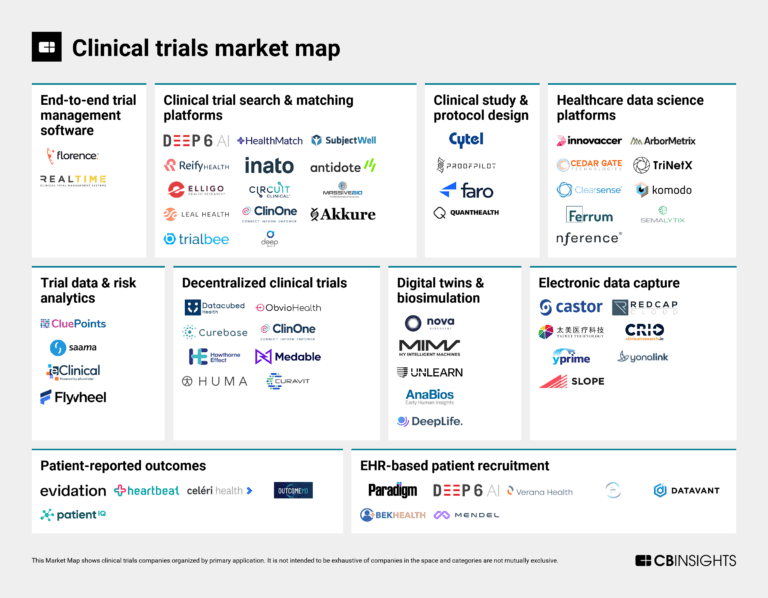
Aug 1, 2023
The clinical trials market mapExpert Collections containing Innovaccer
Expert Collections are analyst-curated lists that highlight the companies you need to know in the most important technology spaces.
Innovaccer is included in 8 Expert Collections, including Unicorns- Billion Dollar Startups.
Unicorns- Billion Dollar Startups
1,270 items
Value-Based Care & Population Health
1,261 items
The VBC & Population Health collection includes companies that enable and deliver care models that address the health needs for defining populations along the continuum of care, including in the community setting, through participation, engagement, and targeted interventions.
Conference Exhibitors
5,302 items
Digital Health 50
300 items
The winners of the second annual CB Insights Digital Health 150.
Digital Health
11,305 items
The digital health collection includes vendors developing software, platforms, sensor & robotic hardware, health data infrastructure, and tech-enabled services in healthcare. The list excludes pureplay pharma/biopharma, sequencing instruments, gene editing, and assistive tech.
Telehealth
3,114 items
Companies developing, offering, or using electronic and telecommunication technologies to facilitate the delivery of health & wellness services from a distance. *Columns updated as regularly as possible; priority given to companies with the most and/or most recent funding.
Innovaccer Patents
Innovaccer has filed 11 patents.
The 3 most popular patent topics include:
- data management
- electronic health records
- health informatics

Application Date | Grant Date | Title | Related Topics | Status |
|---|---|---|---|---|
11/21/2022 | 12/31/2024 | Cryptography, Data management, Computer security, Key management, Computer network security | Grant |
Application Date | 11/21/2022 |
|---|---|
Grant Date | 12/31/2024 |
Title | |
Related Topics | Cryptography, Data management, Computer security, Key management, Computer network security |
Status | Grant |
Latest Innovaccer News
Mar 19, 2025
Prioritizing AI in the C-Suite: Why Every Hospital Needs a CAIO A Chief AI Officer is a strategic necessity to help hospitals navigate the opportunities, challenges, and risks associated with applying AI innovation to improve patient care. By Sandeep (Sandy) Gupta on March 19, 2025 9:46 am Share Copy LinkCopy Link Healthcare delivery is revolutionizing at the fastest pace we’ve seen in decades, and it’s making waves across the industry for the better. Whether we’re taking on accessibility and health equity , improving the claims process , or implementing artificial intelligence (AI), we’re at a breakthrough moment in innovation. It’s a shock, then, that many health systems haven’t yet brought to the executive table Chief AI Officers (CAIO) to help oversee, govern, and lead the innovation that’s possible. After all, this isn’t just another C-suite title. It’s a strategic necessity to help hospitals navigate the opportunities, challenges, and risks associated with applying AI innovation to improve patient care. The CAIO has emerged as a critical — if not the most critical — role for healthcare leadership, especially in a world where the advent of AI has as much potential as it does to affect long-term, high-quality patient care. presented by AI in healthcare: A double-edged sword The latest waves of technology adoption have left many hospitals where we are today: drowning in point-solutions that only solve isolated issues. Yet AI is at the forefront of all the headlines, and the opportunities abound for what healthcare organizations can take on to support their innovation. From diagnostic algorithms that detect cancer in medical images, to predictive models that forecast patient readmissions, the potential applications seem endless. But this abundance of possibilities creates its own challenges, from fragile AI infrastructures, to siloed AI adoption, to compliance risks. Without dedicated AI leadership, hospitals risk: presented by Inadequate evaluation of AI solutions, potentially compromising patient safety and clinical outcomes Missed opportunities for improved efficiency and enhanced care quality Poor integration of existing tools into clinical flows and EHR systems Low scrutiny regarding AI design bias leading to inaccuracies Beyond the algorithm: The CAIO as healthcare’s AI navigator A CAIO brings specialized expertise that bridges the gap between clinical needs, technological capabilities, and organizational strategy. Most health organizations today are considering building dedicated departments for AI given the growing need for adoption. Without centralized AI leadership, any organization risks falling years behind competitors, while investing millions in disconnected technologies that fail to deliver transformative outcomes. CAIOs will not only make AI innovations possible, they’ll also ensure they’re sustainable. Strategic AI integration A CAIO creates an overarching AI strategy that aligns with the goals and mission of the hospital. They identify which solutions will provide the most value through factors such as clinical impact, feasibility of implementation, and return on investment. This strategic integration avoids the spread of ad-hoc adoption of AI tools and invests resources only in those initiatives that could provide the maximum benefit. Guardian of quality and safety oversight Healthcare AI systems demand rigorous validation and monitoring. The CAIO sets up frameworks for rating AI technologies to ensure conformity to clinical standards and regulatory requirements. They collaborate with the clinical departments to assess performance, track outcomes, and institute safety measures. Leading with ethics AI in healthcare raises complex ethical questions about privacy, consent, and algorithmic bias. The CAIO leads the development of ethical guidelines for AI deployment, ensuring that innovation doesn’t come at the expense of patient rights or healthcare equity. They work to identify and mitigate potential biases in AI systems that could affect patient care. Driving digital transformation Successful AI integration requires buy-in from clinicians, staff, and administrators. The CAIO drives cultural transformation, helping stakeholders understand AI’s potential while addressing concerns about automation and job displacement. They ensure AI tools enhance rather than disrupt clinical workflows. Leading the AI revolution As AI continues to transform healthcare, the role of the CAIO will become increasingly crucial. Organizations that invest in this leadership position now will be better positioned to: Keep abreast with the swift changes in the healthcare market and the use of AI Understand where to appropriately invest their AI dollars Safeguard ethical AI use Establish good faith with patients and physicians The future of healthcare with AI leadership The question is no longer if hospitals need dedicated AI leadership, but how soon they can get there. The CAIO is an investment in the future of healthcare delivery. Take the White House recommendation for CAIOs to help organizations stay on top of AI developments, for example, and the creation and facilitation of a CAIO Summit for two years running. Those who wait too long risk falling behind in the AI revolution. They may become unable to make the best medical decisions in such a technology-influenced environment. The hour to act is now. Source: DNY59, Getty Images Sandy Gupta is the Chief Operating Officer and co founder at Innovaccer , a leading San Francisco-based healthcare IT company dedicated to accelerating innovation in healthcare. He co founded Innovaccer to fulfill his vision to unlock the value of data through a common cloud framework (the Innovaccer platform), enabling healthcare stakeholders to unify patient data across systems and care settings —i ncluding 80+ EHR interfaces — and leverage unified patient records to drive integrated workflows, coordinated care, and analytic insights crucial to effective value-based care delivery. This foundation led to Innovaccer’s success as a national leader for population health management technology and solutions, with more than 30 awards and 90 analyst recognitions from Gartner, KLAS, Forbes, Black Book, UCSF, Deloitte, and others. In 2022 and 2023, the Innovaccer platform was ranked healthcare’s #1 Data and Analytics platform by KLAS. In 2021, Innovaccer was recognized as Best in KLAS for Population Health Management. In 2023, Black Book ranked Innovaccer the #1 End-To-End Hospital System Population Health Technology Platform. This post appears through the MedCity Influencers program. Anyone can publish their perspective on business and innovation in healthcare on MedCity News through MedCity Influencers. Click here to find out how . Topics
Innovaccer Frequently Asked Questions (FAQ)
When was Innovaccer founded?
Innovaccer was founded in 2014.
Where is Innovaccer's headquarters?
Innovaccer's headquarters is located at 101 Mission Street, San Francisco.
What is Innovaccer's latest funding round?
Innovaccer's latest funding round is Series F.
How much did Innovaccer raise?
Innovaccer raised a total of $650.68M.
Who are the investors of Innovaccer?
Investors of Innovaccer include M12, B Capital, Banner Health, Generation Investment Management, Danaher Ventures and 29 more.
Who are Innovaccer's competitors?
Competitors of Innovaccer include Navina, Smile Digital Health, Datavant, Lifen, Lumeris and 7 more.
What products does Innovaccer offer?
Innovaccer's products include Data Activation Platform (DAP) and 4 more.
Who are Innovaccer's customers?
Customers of Innovaccer include Kaiser Permanente, CommonSpirit and St Peter's Health.
Loading...
Compare Innovaccer to Competitors

Arcadia focuses on transforming healthcare data into actionable insights within the healthcare analytics and data management industry. The company offers a data platform that facilitates high availability data ingestion, computation, and storage and provides tools for care management, patient engagement, and analytics to improve healthcare outcomes. Arcadia primarily serves healthcare providers, payers, and government entities with strategies for managing population health and risk-based contracts. It was founded in 2002 and is based in Boston, Massachusetts.

NextGen Healthcare provides healthcare technology and data solutions within the health IT industry. The company provides electronic health records (EHR), practice management, and revenue cycle management systems, alongside patient engagement tools, telehealth services, and analytics. NextGen Healthcare serves mid-size and enterprise healthcare practices, as well as small practices. It was founded in 1974 and is based in Horsham, Pennsylvania.

Optum is a health services and innovation company focused on improving healthcare delivery, quality, and efficiency across various sectors. The company offers a range of services including data and analytics, healthcare operations, pharmacy care services, and population health management. Optum primarily serves physicians, practices, health care facilities, and individual consumers. It was founded in 2011 and is based in Eden Prairie, Minnesota.

Komodo Health specializes in healthcare analytics and operates within the healthcare technology sector. The company offers a platform that provides insights by analyzing a range of healthcare data, aiming to improve patient care and reduce disease burden. Komodo Health primarily serves life sciences companies, healthcare practitioners, payers, and patient advocacy groups with its suite of software applications designed to deliver value in healthcare through data-driven insights. It was founded in 2014 and is based in San Francisco, California.

Redox offers an application program interface technology. It provides a modern application programming interface (API) for healthcare, allowing software to easily and securely interoperate with electronic health records (EHRs) in a health system infrastructure. The company offers various products, such as Nova, which has real-time data in the cloud, Chroma, which has patient identity records, and more. It was founded in 2014 and is based in Madison, Wisconsin.

MedeAnalytics is involved in healthcare data analytics, focusing on providing insights to improve financial, operational, and clinical outcomes within the healthcare sector. The company offers a cloud-based analytics platform that includes predictive analytics, data interoperability, and reporting to assist with value-based care, population health management, and revenue cycle management. MedeAnalytics serves healthcare payers, providers, and government programs with its range of analytics services. It was founded in 1994 and is based in Richardson, Texas.
Loading...

